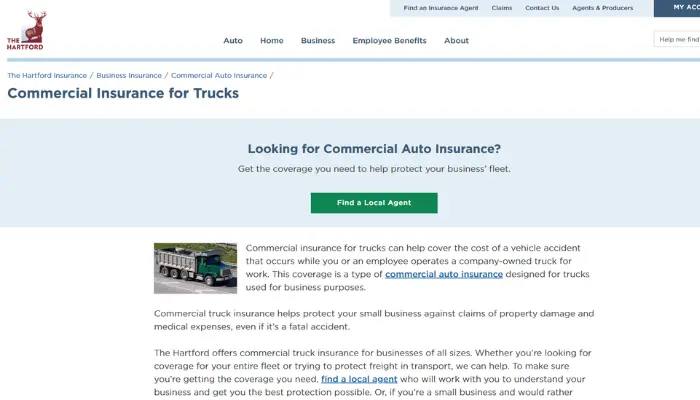Why Is Cargo Transport Insurance The Hartford Essential?
Cargo transportation is an essential activity for the economy, but it also involves risks. This is why Cargo Transport Insurance The Hartford stands out, offering solutions to protect goods and ensure the financial security of companies and carriers.
Advertisements
In this article, we’ll explore everything you need to know about this insurance, covering its types, coverage, and other key aspects.
Advertisements
Types of Cargo Insurance
When discussing cargo transport insurance, it’s crucial to understand the different types available to ensure your goods are adequately protected throughout their journey.
The nature of your operations, the mode of transport, and the inherent risks involved play a significant role in determining the right type of coverage. Each insurance option addresses specific needs and scenarios, whether you’re transporting goods by land, sea, or air.
Advertisements
Selecting the appropriate type of insurance not only safeguards your cargo but also provides peace of mind and compliance with legal requirements. Below, we outline the main types of cargo insurance:
- National and International Insurance
Covers goods transported within the country or in international operations. Ideal for companies involved in import and export. - RCTR-C (Civil Liability for Road Cargo Transport)
Mandatory for road carriers, it covers damages caused to third parties in accidents during transportation. - RCF-DC (Optional Civil Liability for Cargo Disappearance)
Focused on cases of theft or total disappearance of goods, complementing the RCTR-C. - Autonomous Carrier Insurance
Designed for independent professionals, ensuring protection against damages and theft.
Offered Coverage

The protection provided by Cargo Transport Insurance The Hartford is designed to address the diverse risks that cargo faces during transit, whether by land, sea, or air.
These risks can range from minor damages to complete losses caused by unexpected events. The wide array of coverage options allows businesses to tailor their policies to meet specific operational needs, ensuring their goods are safeguarded at every step.
Whether you’re transporting high-value merchandise or bulk commodities, understanding the available coverage types is crucial to avoid financial losses and maintain uninterrupted operations. Below are the most common coverage options:
- Physical Damage: Protection against damage to goods caused by accidents.
- Theft and Burglary: Ensures the replacement value of goods in theft cases.
- Total or Partial Loss: Covers losses caused by unforeseen events such as fires or natural disasters.
- Additional Coverage: Includes protection against strikes, protests, contamination, and even extreme weather conditions.
Before purchasing, take the time to evaluate your business’s unique needs and identify which coverage options are most critical. This will help you create a robust policy that aligns with your operational risks and ensures your peace of mind.
How Cargo Transport Insurance Works
Understanding how Cargo Transport Insurance The Hartford operates is key to making the most of its benefits and ensuring your goods are always protected.
This type of insurance follows a straightforward process designed to provide clarity and efficiency, from the moment you contract the policy to filing a claim if needed.
By familiarizing yourself with each step, you can ensure that your cargo is adequately covered, avoid unnecessary delays, and simplify any claim process. Below is an outline of how this insurance typically works:
- Contracting: Choose the insurer, provide details about the cargo and the route.
- Policy Issuance: The insurer issues a document detailing the coverage conditions.
- During Transport: The cargo is protected against the risks specified in the policy.
- Claim Filing: In case of an incident, notify the insurer, submit the necessary documents, and wait for the analysis and compensation process.
Tip: Always keep transportation documents and the policy up-to-date to avoid issues when filing a claim.
Importance of Cargo Insurance
Cargo insurance is a vital safeguard for businesses that rely on transporting goods, whether domestically or internationally. The journey of goods often involves inherent risks such as accidents, theft, or natural disasters, all of which can lead to significant financial losses.
Without proper coverage, these incidents could disrupt operations, damage relationships with clients, and even jeopardize the future of the business.
By investing in Cargo Transport Insurance The Hartford, you not only protect your shipments but also enhance your company’s reputation and compliance with industry standards. Below are the main reasons why this insurance is indispensable:
- Financial Risk Mitigation: Prevents losses from damages or theft, ensuring your business remains financially secure.
- Compliance with Legal Requirements: Many transport types require specific insurance by law, helping you avoid penalties and operational setbacks.
- Increased Credibility: Companies that use insurance demonstrate professionalism, reliability, and a commitment to their clients’ needs.
Investing in cargo insurance is more than just an expense—it’s a strategic move to secure your business and its reputation in a competitive market.
Contracting Process
Purchasing Cargo Transport Insurance The Hartford is an essential step to ensure your goods are protected during transit, and the process can be simple and efficient when approached systematically.
By following a structured approach, you can find a policy that aligns perfectly with your business’s unique needs, while also ensuring compliance with legal and operational requirements.
Whether you’re new to cargo insurance or looking to upgrade your coverage, understanding the process helps you make informed decisions. Below are the key steps to successfully contract this insurance:
- Analyze Your Needs
Identify the type of goods, frequent routes, and associated risks. - Research Insurers
Compare companies and read reviews. Ensure the insurer has a strong reputation in the market. - Request Quotes
Provide detailed information about your operations and request pricing. - Review the Policy
Verify if the conditions and coverage meet your needs before signing. - Contract the Insurance
After reviewing all details, sign the contract and secure your protection.
Costs and Premium Calculation
Understanding the costs involved in Cargo Transport Insurance The Hartford is crucial for making a well-informed decision. The insurance premium, or the amount paid to secure coverage, is influenced by various factors related to the nature of your cargo and the specifics of your operations.
Factors such as the value of the goods, the mode of transport, and the risks associated with the route all play a role in determining the premium. By assessing these aspects and negotiating effectively, businesses can achieve a balance between comprehensive coverage and cost-effectiveness.
Below are the key elements that influence the cost:
- Type and Value of Goods: High-value goods generally have higher premiums.
- Mode of Transport: Land transport is usually cheaper than air or sea transport.
- Route: Risks associated with the route, such as dangerous regions, influence the cost.
- Claims History: Companies with a history of claims may pay higher premiums.
Tip: Negotiate with the insurer and look for a balance between cost and coverage.
Legal and Regulatory Obligations
Cargo transport is a heavily regulated sector, and insurance plays a critical role in ensuring compliance with these regulations. Certain types of insurance, such as RCTR-C for road carriers, are not just recommended but legally mandatory.
Adhering to these obligations is essential to avoid penalties, fines, and potential interruptions to your business operations. Beyond fulfilling legal requirements, staying compliant also demonstrates a commitment to safety, professionalism, and ethical practices.
To ensure smooth operations and regulatory compliance, consider the following best practices:
- Ensure your company complies with all current regulations.
- Keep updated records of policies and insurance certificates.
- Notify the insurer about any operational changes that may impact the insurance.
Main Challenges and Points of Attention
While cargo insurance is a critical tool for protecting goods in transit, it is not without its complexities. Businesses often encounter challenges when managing their insurance policies, from navigating detailed paperwork to ensuring the coverage fully aligns with their needs.
Understanding these potential hurdles can help you prepare and avoid costly mistakes, ensuring your insurance works seamlessly when you need it most. Below, we outline the most common issues faced by businesses and practical solutions to address them effectively:
- Excessive Bureaucracy
Solution: Work with an experienced broker to streamline processes. - Insufficient Coverage
Solution: Read the policy carefully and adjust the coverage as needed. - Premium Adjustments
Solution: Negotiate long-term contracts to avoid frequent changes. - Indemnity Issues
Solution: Keep all documentation organized and adhere to deadlines for claim notification.
The Cargo Transport Insurance The Hartford is an indispensable solution for companies involved in goods transportation. With the information and tips in this article, you’ll be prepared to choose the ideal insurance and ensure the protection your cargo deserves.
If you still have questions, consult specialists and find the best coverage for your needs.





